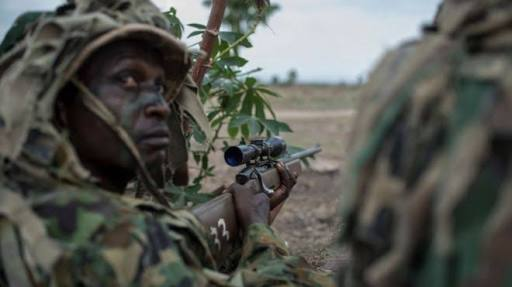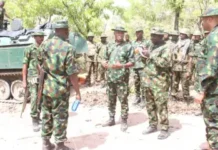Tension is rising among the top hierarchy of the Nigerian military as fears continue to spread of an imminent rebellion among the rank and file, The Punch has learnt.
Correspondents who spoke to four senior officers, including a Major General, learnt that many of the soldiers, especially those at the warfront, had been showing signs of agitation over the inability of the military high command to provide them with weapons and adequate welfare.
One of the officers said, “I can tell you without mincing words that many of us, officers, are afraid because the soldiers can revolt anytime from now.
You will recall that some soldiers of the 21 Brigade in Sambisa Forest last year went on the rampage, revolting against their superiors.
“Such rebellion only happens when the officers lose the trust of their men. The soldiers have been complaining about lack of weapons and welfare but their demands are being ignored. Always remember that whenever there is an attack, if 40 soldiers are killed, only two officers will be affected. This is because the soldiers are the ones at the battlefront.
“If they feel they are being led to their death, they will rather revolt and save themselves rather than die. As it is, we are fearful of what may happen. We don’t want a Bangladeshi Rifle Revolt in Nigeria like it happened in 2009 in Bangladesh where soldiers killed 57 officers.”
A major general told The Punch that apart from the lack of weapons, the military was losing the anti-insurgency war due to two principal reasons — strategy and lack of synergy among the service chiefs.
The source alleged that there was disunity among the service chiefs which was beginning to affect the fight against terror.
He added, “The Chief of Defence Staff, Gen. (Abayomi) Olonishakin, has no control over the service chiefs. He summons meetings and the service chiefs don’t come.
“The indiscipline has reached a level that the service chiefs now bypass the CDS and the Minister of Defence and write letters directly to the President. The service chiefs even attended Mr President’s campaign launch recently. This is not the military I (have) spent 33 years serving. You don’t break the chain of command.”
The senior military officer said the service chiefs had become lords unto themselves and were not open to alternative views.
He added, “On several occasions during our security meetings, if you bring up an alternative view, you become an easy target for those in power. These service chiefs have stayed for too long and are now bereft of new ideas.
“From the order we were given, Boko Haram is not supposed to occupy an inch of Nigeria’s territory. The strategy they decided to use was to spread our men thinly across the border so that we can boast that no territory is under Boko Haram.
“What we should have done is to allow Boko Haram have a particular territory which we can identify and then we would unite our men on one front and form a wall. We would then attack the insurgents head on. Our men are just being killed because they are thinly spread.”
Also, a colonel said the United States Africa Command had not been giving Nigeria the much needed Intelligence, Surveillance and Reconnaissance – ISR.
He added, “In the past, AFRICOM would provide us with intelligence and then the Nigerian Air Force would bomb terrorists’ strongholds.
“However, this arrangement seems not to be working anymore. What AFRICOM has been doing is to boost security in Niger Republic in order to prevent terrorists from getting their hands on uranium.
“It may seem they do not trust Nigeria with intelligence anymore.”
A peace, security and conflict Consultant, Group Capt. Sadeeq Shehu (retd.), said recently on Channels Television that the Nigerian forces were not given the required intelligence from the United States, the United Kingdom, France and other world powers.
He said, “One area in which we are lacking and which was very decisive in Colombia is having real and live intelligence. The US Command was able to show the Colombian forces exactly where insurgent were at any particular time. We don’t have this in Nigeria.
“When the President is going to meet our allies in other countries, I will suggest humbly that we talk to these allies – US, UK, France; they have the capacity to give us satellite imagery. So, instead of our troops fighting and waiting for Boko Haram to attack, they will be able to know, 24/7, where Boko Haram is. It makes it very easy.”
He advised the military to be honest with the government as regards its needs rather than pretending that all was well.
The retired air force officer said he got information that the US and others were not giving Nigeria information because of capacity and human rights issues.
Shehu added, “I understand from my own investigations that these allies also have their misgivings about giving us live intelligence. The story going round is that they are not sure of our capacity to utilise that information in a very ethical way or in a way that protects human rights. But there is an improvement on our human rights records.”



























